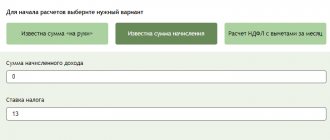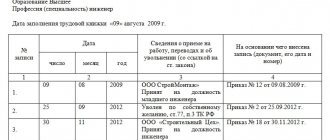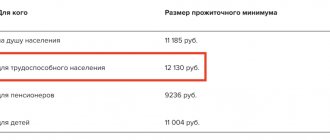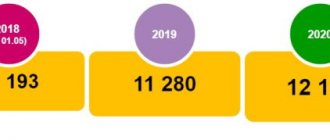What documents should I take when applying for a job in 2022?
Since the new year, a new set of documents for candidates for vacancies has been in effect. What documents will applicants submit from January 1, 2021?
| Important! The old rules apply only to those workers who decided to leave a paper work book and wrote a statement about it. |
In relation to the rest, the algorithm of your actions is as follows:
- The candidate is employed for the first time. You issue him only an electronic TC.
- The employee refused to have a paper work record at his previous job in 2022. This fact will be recorded in his paper work record, which the employer will hand over to him. When hiring, he will provide you with a certificate in the STD-R form. You will need his paper work record in order to find out about the data necessary for the length of service; you do not need to take it for storage. You also have the right to request a certificate from him in the STD-PFR form if there is insufficient data or absence of a labor document.
| Advice The employee will be able to obtain this information from the Pension Fund of Russia by applying there with a passport. Also, in cases of insufficient data in the Pension Fund, you can contact the fund with a work book to supplement the missing information. |
How to properly inform employees
From March 1, 2022, a new article 216.1 will appear in the Labor Code of the Russian Federation, which establishes the employee’s right to receive information about labor conditions and safety. In this case, the obligation to provide this information rests with the employer.
By its order No. 773n dated October 29, 2021 (registered by the Ministry of Justice No. 66317 on December 14, 2021), the Ministry of Labor approved forms for informing workers about their labor rights.
Read more on the topic:
How to inform workers about labor rights and safety in 2022: Rostrud recommends
HR department nomenclature 2022 and reporting
From January 1, 2022, changes in personnel records are in effect. A new nomenclature of cases has been introduced based on the order of the Federal Archive of December 20, 2019 No. 236. Check the storage periods for documents and update them in accordance with the list. If new cases have appeared, record this in the nomenclature.
| Important! You will have a file related to the transition to the ETC, in which you can store notifications and employee statements. |
SZV-TD report for January 2022
We remind you that you must submit it before February 15th. Resolution of the Board of the Pension Fund of the Russian Federation dated December 25, 2019 No. 730p approves a unified procedure for submitting reports.
| Advice If you hired or fired someone from your job, you must report no later than the next working day. If there have been no changes in the staffing structure, the zero report is not submitted. |
What information will be included in the January report:
- about applications for a work book form in January 2022, if employees did not write them in 2022;
- about those employees for whom you have never transferred data to the Pension Fund of Russia in 2022 (as of January 1, 2020);
- about transfers processed in January 2022.
Check yourself and clarify the deadlines for submitting personnel reports in 2022.
What not to take in 2021
Order of the Federal Tax Service of Russia dated October 15, 2020 No. ED-7-11/ [email protected] canceled the form on the average headcount. Now it is indicated in a special field in the calculation form for insurance premiums (DAM) for the period 2022 and subsequent ones.
| Important! There is no need to submit a report on the average number of employees to the tax office from January 2022. |
Personnel EDI
- The Ministry of Labor has legislatively established the procedure for conducting an experiment on the use of personnel electronic documents (Order No. 240n dated May 14, 2020).
Law No. 122-FZ dated April 24, 2020 “On conducting an experiment on the use of electronic documents...”, adopted at the height of the epidemic.
It came into force on May 5, 2022, and from this date an experiment on personnel e-document flow was launched, which will last until March 31, 2022. The order of the Ministry of Labor defines the organizational nuances of conducting the experiment and monitoring its progress. Recommendations are also given to employers ─ the need to submit an application before December 1, 2020 to participate in the experiment, the employer’s independent choice of the start date for its implementation, and others.
How is the HR EDI experiment going?
When summing up the interim results of the experiments, officials of the Federal Service for Labor and Employment noted (Information from the Ministry of Labor dated June 26, 2020):
- Employers have the right to use both their own information systems and the “Work in Russia” platform for personnel e-document flow.
- To work in the system, the employer needs to register with the Unified Identification and Logistics Agency and have a UKEP, and the employee needs to have an account on the State Services portal.
- In the second half of July, after the Ministry of Labor selects employers, a test period will begin on the “Work in Russia” platform.
- From October 1, 2020, this service will become available to interested employers.
Using the new service, HR officers will be able to conclude, change, terminate and store employment contracts electronically, as well as conduct personnel document flow without duplicating them on paper.
If you have unresolved questions about changes in legislation, you can find answers to them in ConsultantPlus.
Full and free access to the system for 2 days.
New rules for remote work
From January 1, 2022, you will be able to register for remote work in emergency circumstances - such changes were made to the Labor Code 2022. In this situation, it is not the employee’s consent that is required, but a local act. In it you will write down the rationale for remote work and describe the work schedule. For those for whom the remote mode is not applicable, arrange a simple one with payment of ⅔ of the rate.
Since the new year, permanent and temporary remote work has been used, and a combined mode is also possible. Two grounds are introduced for dismissing a remote worker:
- inability to continue working for objective reasons (moving to another location);
- the employee does not contact for more than 2 days.
| Important! In 2022, the Labor Code directly prohibits introducing additional grounds for dismissing a remote worker and reducing his salary |
Read more about changes to the Labor Code regarding remote work here.
About interaction with a remote worker
Changes have also been made here - they have approved the employer’s right to establish any form of communication that is convenient for both parties. Pay special attention to ensuring that you can later prove that you sent the correspondence to the employee and that he received it.
The rules for using electronic signatures have been simplified - enhanced qualified electronic signature is used only when drawing up additional agreements and contracts. In other cases, you can use a simple ES.
Innovations in document preparation
Develop a LNA on transfer to temporary remote work in exceptional situations and coordinate it with the trade union. Authorization has been officially established to formalize the transfer of an employee to remote work by an additional agreement to the employment contract. Add to the LNA how to interact with remote workers:
- collective agreement;
- an employment contract or an additional agreement to it.
| Advice Send the employment contract on paper to the remote employee if he asks for it. |
Read more about registering as a remote worker and developing LNA on temporary remote work in this article.
Types of interpretations
We consider it our duty to warn our readers that the overwhelming majority of comments to the Labor Code of the Russian Federation, available in free Internet access, cannot serve as an unconditional basis for their use in a specific labor relationship.
The fact is that absolutely everyone has the right to comment and interpret the Labor Code of the Russian Federation. However, only interpretations given at the official level can serve as a guide to action.
Incorporating existing interpretations is a technically difficult task, therefore at the moment there is no single collection of normative and casual interpretations of the Labor Code. The currently available interpretations of the articles of the Labor Code are scattered and are contained in many bulletins and statements related to the practice of the Supreme and Constitutional Courts of the Russian Federation.
The differentiation of interpretations is directly dependent on their legal consequences.
Thus, interpretations and comments of various ministries and departments regarding articles of the Labor Code of the Russian Federation do not give rise to legal consequences, since they are not mandatory for application.
At the same time, official interpretations given by the competent authority and published in a special act are equal in legal force to the normative act itself and, as a result, become mandatory for application. In essence, such interpretations are a directive issued by the state explaining exactly how a particular rule of law should be applied.
In turn, competent official interpretations and comments are divided into two types: normative and casual.
Normative interpretation is the equivalent of a law that obliges any bodies applying the law to act in a certain way when referring to a particular article of the Labor Code of the Russian Federation in the event that the article itself contains violations of logic or allows for double understanding.
As a rule, normative interpretations are given by the body that developed and approved the law. In the conditions of the Russian Federation, these bodies are:
- State Duma of the Russian Federation;
- President of the Russian Federation;
- legislative bodies at the regional level;
- Constitutional Court of the Russian Federation regarding the provisions of the Constitution;
- Plenum of the Supreme Court of the Russian Federation and Plenum of the Supreme Arbitration Court of the Russian Federation. Interpretations of normative acts in the light of their application in judicial practice are formalized in the form of Resolutions of the Plenum of the Supreme Court and the Supreme Arbitration Court of the Russian Federation. First of all, these decisions are binding on the judiciary.
Casual interpretation may include one or another decision of a judicial body that provides an interpretation of a rule of law in a specific legal relationship. The mandatory execution of casual interpretation applies only to this specific legal relationship.
A subtype of casual interpretation is administrative interpretation. For example, the administrative interpretation of articles of the Labor Code of the Russian Federation is given by the Ministry of Labor of the Russian Federation, and the articles of the Tax Code of the Russian Federation are given by the Federal Tax Service of the Russian Federation. The scope of these interpretations is the subordinate bodies. For example, the interpretations given by the Ministry of Labor of the Russian Federation will not be binding for the court.
As for the various interpretations of Labor Code given by public organizations, Internet sites or practitioners, all of them will be unofficial and of a purely advisory or scientific nature.
Based on their source of origin, unofficial interpretations and comments can, in turn, be differentiated based on their competence or incompetence.
We recommend that you be wary of interpretations from incompetent sources. They can almost always be distinguished from competent sources by their lack of legal terminology.
Covid situation
After the New Year, the Sanitary Rules approved by the Chief Sanitary Doctor of the Russian Federation will continue to apply. They were amended by Resolution No. 35 of November 13, 2020, and the validity was extended until January 1, 2022. All employers must comply with the rules. Still needed:
- carry out thermometry;
- disinfect premises;
- disinfect the air, etc.
| If the incidence rate is high in the region, employers are recommended to transfer workers to remote mode, cancel events with large crowds of employees, and continue to apply a variable work schedule and lunch breaks. |
Inspections by Rospotrebnadzor will continue, and regional authorities will also monitor compliance with restrictive measures.
Read about the grounds for unscheduled inspections and the list of the most common violations by employers on our website.
New rules for shift work
In the situation of the spread of a viral infection, the news of labor legislation 2022 affected shift work. New rules have been established for shift workers:
- Government Decree No. 601 dated April 28, 2020;
- by letter of Rospotrebnadzor dated April 30, 2020 No. 02/8480-2020-24.
| Important! In some cases, it is allowed to extend the shift time with the consent of the employee with the execution of an additional agreement to the employment contract. |
It is recommended to transfer from a rotational job to a similar one within the same region. For workers after rest who are not involved in shift work due to the pandemic, pay is calculated as idle time with payment of ⅔ of earnings. Rospotrebnadzor does not recommend employing persons over 65 years of age; other workers must undergo a medical examination before going on shift. Two days before departure, employers will arrange for a COVID-19 test. The organization of meals and accommodation for shift workers is carried out in accordance with the Recommendations of Rospotrebnadzor.
Changes in hiring foreigners
New for HR officers in 2022 in organizations that accept foreign workers. Employers need to bring the number of such employees into compliance with Government Decree No. 1823 dated November 12, 2020 by January 1, 2022. From now on, new quotas for 2022 come into effect - 101,871 people.
| Exception Quotas do not apply to visa-free workers with a patent and highly qualified specialists. |
Since that time, new forms of notifications to the Ministry of Internal Affairs have been in effect - on the conclusion / termination of an employment contract with a foreigner, on payments to a foreign worker or specialist - Order of the Ministry of Internal Affairs of Russia dated July 30, 2022 N 536.
Read about what you need to take into account when hiring foreigners in 2022 here.
Legislators clarified Part 3.2 of Article 20 No. 109-FZ of July 18, 2006 - the notification must be submitted to the foreigner or the receiving party in person within seven working days from the date of arrival, except for the employing organizations on the list. They are given one day.
New documents for foreign employees
From 01/01/2021 new forms are applied:
- notifications of the Ministry of Internal Affairs on the admission and dismissal of a foreigner;
- to issue a foreign employee a work permit, extend its validity or issue a duplicate.
Reasons:
– Order of the Ministry of Internal Affairs of July 30, 2020 No. 536; – Order of the Ministry of Internal Affairs dated July 30, 2020 No. 533.
Employer checks - what's new in 2022
The moratorium on inspections for small and medium-sized enterprises has been extended until December 31, 2022. The Decree of the Government of the Russian Federation of April 3, 2020 N 438 lists the grounds for unscheduled inspections.
| Important! Unscheduled inspections are carried out at all enterprises based on information about violations. |
Other companies will be inspected depending on the risk category.
Read our material about Rospotrebnadzor inspections during the danger of the spread of coronavirus.
Government Decree No. 1969 of November 30, 2020 introduces new regulations for scheduled inspections to minimize contacts between inspectors and those being inspected - using remote interaction tools. The resolution regulates the replacement of a scheduled inspection with an inspection visit.
New procedure for calculating the average number of employees
In 2022, the rules for generating report No. P-4 (information on the number and wages of employees) will change. Rosstat Order No. 706 dated November 17, 2020 clarifies the methods for calculating the average number of employees issued under GPC agreements. In particular, the Order contains explanations about the period of validity of such an agreement, if the date of conclusion of the agreement providing for a specific period for the performance of work or provision of services does not coincide with the date of their start.
In addition, the document supplements the list of categories of employees that need to be included in the calculation: pregnant employees who are released from work until they are provided with another job that excludes exposure to adverse production factors are now counted as whole units.









